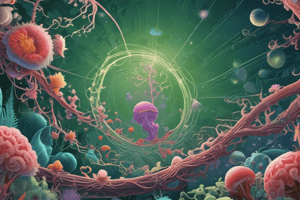Podcast
Questions and Answers
What is the primary function of nutrition in living organisms?
What is the primary function of nutrition in living organisms?
- To regulate body temperature
- To facilitate movement
- To provide necessary nutrients and energy (correct)
- To remove waste products
Which of the following is NOT a part of the respiration process?
Which of the following is NOT a part of the respiration process?
- Photosynthesis (correct)
- Ventilation
- Diffusion
- Transportation
What is the result of the metabolism process?
What is the result of the metabolism process?
- Complex substances are formed
- Waste products are produced
- Energy is released (correct)
- Energy is stored
What is the primary source of nutrients for autotrophs?
What is the primary source of nutrients for autotrophs?
What is the byproduct of respiration that needs to be removed from the body?
What is the byproduct of respiration that needs to be removed from the body?
What is the overall purpose of life processes?
What is the overall purpose of life processes?
What is metabolism composed of?
What is metabolism composed of?
What is the purpose of excretion?
What is the purpose of excretion?
What is reproduction essential for?
What is reproduction essential for?
What is sensitivity and response involved in?
What is sensitivity and response involved in?
What is movement essential for?
What is movement essential for?
What do the life processes work together to ensure?
What do the life processes work together to ensure?
Flashcards are hidden until you start studying
Study Notes
Understanding Life Processes
Life processes are the fundamental functions that all living organisms, from simple bacteria to complex multicellular organisms like humans, perform to maintain their existence. These processes are necessary for survival, growth, and reproduction. In this article, we will explore the various life processes, their roles, and how they contribute to the overall functioning of living organisms.
Nutrition
Nutrition is the process by which organisms obtain food and convert it into energy. This process is essential for providing the necessary nutrients and energy to sustain life. Nutrients can come from various sources, such as plants, animals, or manufactured products. The mode of nutrition varies among organisms, with some being autotrophs (producing their own food) and others being heterotrophs (obtaining food from other organisms).
Respiration
Respiration is the process of exchanging gases between an organism and its environment. It includes the processes of ventilation (moving air into and out of the body), diffusion (the exchange of gases across cell membranes), and transportation (moving gases around the body in the bloodstream). Respiration is crucial for providing oxygen to cells and removing carbon dioxide, a waste product.
Metabolism
Metabolism is the process of breaking down complex substances into simpler ones and releasing energy. It involves both catabolism (breaking down molecules) and anabolism (building up molecules). Metabolism is essential for providing energy and maintaining the balance of chemical reactions in the body.
Transportation
Transportation is the movement of substances, such as nutrients, waste products, and hormones, within an organism. It can occur through various means, such as diffusion (passive movement), osmosis (movement of water), or active transport (movement driven by energy).
Reproduction
Reproduction is the process by which organisms produce offspring. It can be either asexual, involving one parent and offspring, or sexual, involving two parents and the exchange of genetic material. Reproduction is essential for the continuation of species and maintaining biodiversity.
Excretion
Excretion is the process of eliminating waste products from an organism. It can occur through various means, such as urination, defecation, or respiration (carbon dioxide elimination). Excretion is essential for maintaining homeostasis and removing toxins from the body.
Growth and Development
Growth and development refer to the increase in size and complexity of an organism over time. They can occur through cell division (mitosis) or cell enlargement. Growth and development are essential for maintaining homeostasis and adapting to environmental changes.
Sensitivity and Response
Sensitivity and response involve the ability of organisms to detect changes in their internal or external environment and respond accordingly. This can occur through specialized structures, such as eyes or taste buds, and is essential for survival and adaptation.
Movement
Movement is the ability of organisms to change their position or location. It can occur through various means, such as muscle contractions or flagella, and is essential for obtaining food, finding mates, and avoiding predators.
Regulation and Homeostasis
Regulation and homeostasis involve the maintenance of a stable internal environment, despite external changes. This can occur through various means, such as hormones and nervous system control, and is essential for maintaining life.
In conclusion, life processes are vital for the survival, growth, and reproduction of all living organisms. They work together in a fine-tuned balance to ensure the well-being of the individual and the continuation of life.
Studying That Suits You
Use AI to generate personalized quizzes and flashcards to suit your learning preferences.



